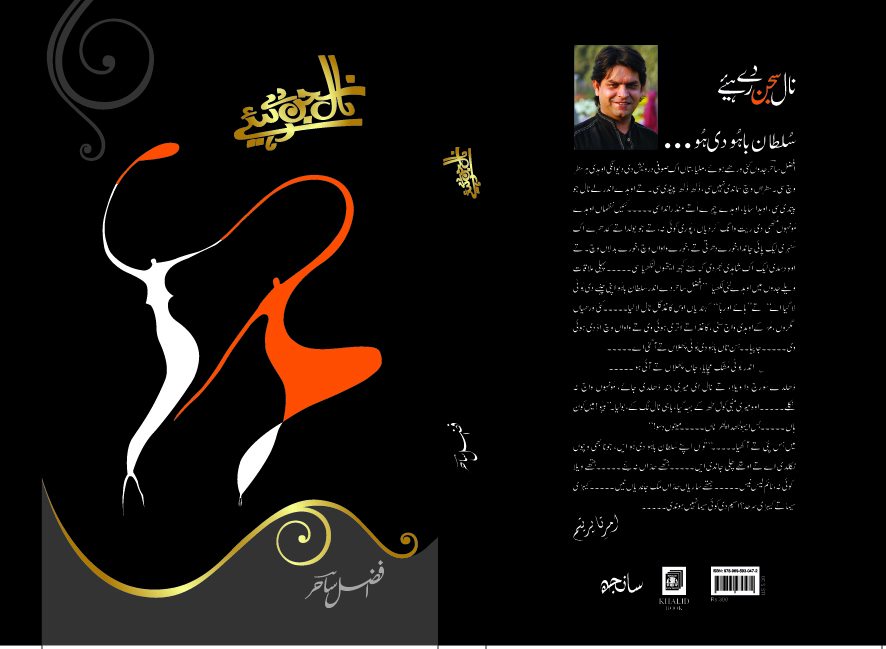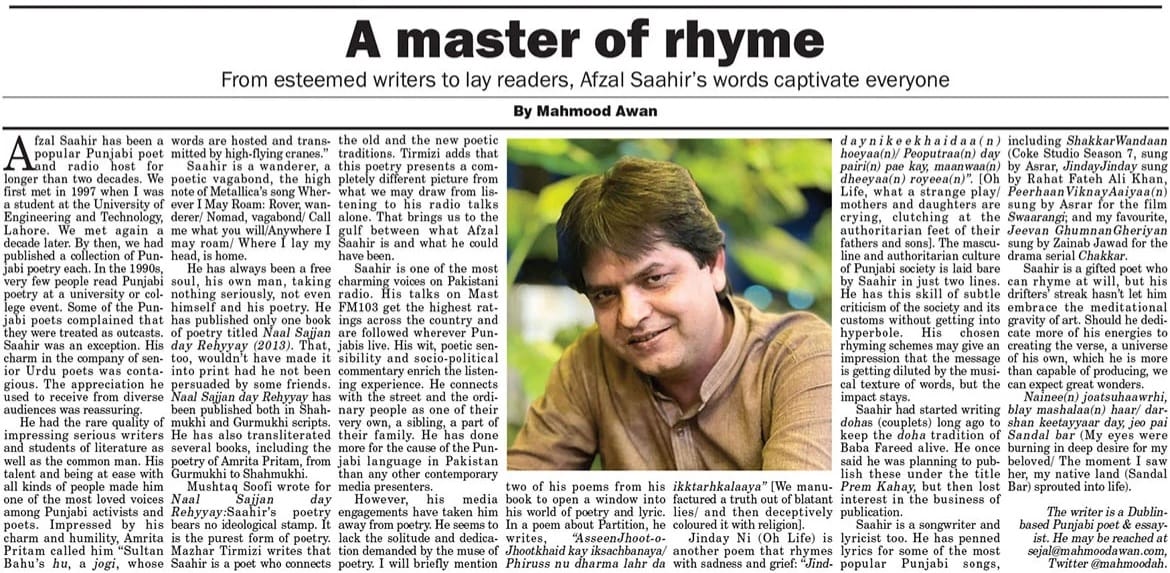Mahmood Awan (The News on Sunday, 12th March 2023)
Afzal Saahir has been a popular Punjabi poet and radio host for longer than two decades. We first met in 1997 when I was a student at the University of Engineering and Technology, Lahore. We met again a decade later. By then, we had published a collection of Punjabi poetry each. In the 1990s, very few people read Punjabi poetry at a university or college event. Some of the Punjabi poets complained that they were treated as outcasts. Saahir was an exception. His charm in the company of senior Urdu poets was contagious. The appreciation he used to receive from diverse audiences was reassuring.
He had the rare quality of impressing serious writers and students of literature as well as the common man. His talent and being at ease with all kinds of people made him one of the most loved voices among Punjabi activists and poets. Impressed by his charm and humility, Amrita Pritam called him “Sultan Bahu’s hu, a jogi, whose words are hosted and transmitted by high-flying cranes.”
Saahir is a wanderer, a poetic vagabond, the high note of Metallica’s song Wherever I May Roam: Rover, wanderer/ Nomad, vagabond/ Call me what you will/Anywhere I may roam/ Where I lay my head, is home.
He has always been a free soul, his own man, taking nothing seriously, not even himself and his poetry. He has published only one book of poetry titled Naal Sajjan day Rehyyay (2013). That, too, wouldn’t have made it into print had he not been persuaded by some friends. Naal Sajjan day Rehyyay has been published both in Shahmukhi and Gurmukhi scripts. He has also transliterated several books, including the poetry of Amrita Pritam, from Gurmukhi to Shahmukhi.
Mushtaq Soofi wrote for Naal Sajjan day Rehyyay:Saahir’s poetry bears no ideological stamp. It is the purest form of poetry. Mazhar Tirmizi writes that Saahir is a poet who connects the old and the new poetic traditions. Tirmizi adds that this poetry presents a completely different picture from what we may draw from listening to his radio talks alone. That brings us to the gulf between what Afzal Saahir is and what he could have been.
Saahir is one of the most charming voices on Pakistani radio. His talks on Mast FM103 get the highest ratings across the country and are followed wherever Punjabis live. His wit, poetic sensibility and socio-political commentary enrich the listening experience. He connects with the street and the ordinary people as one of their very own, a sibling, a part of their family. He has done more for the cause of the Punjabi language in Pakistan than any other contemporary media presenters.
However, his media engagements have taken him away from poetry. He seems to lack the solitude and dedication demanded by the muse of poetry. I will briefly mention two of his poems from his book to open a window into his world of poetry and lyric. In a poem about Partition, he writes, “Asseen Jhoot-o-Jhootee khaid kay ik sach banaya/ Phir uss nu dharmi lahr da ikk tarrka laaya” [We manufactured a truth out of blatant lies/ and then deceptively coloured it with religion].
Jinday Ni (Oh Life) is another poem that rhymes with sadness and grief: “Jindday ni kee khaidaa(n) hoeyaa(n)/ Peo putraa(n) day pairi(n) pae kay, maanwaa(n) dheeyaa(n) royeea(n)”. [Oh Life, what a strange play/ mothers and daughters are crying, clutching at the authoritarian feet of their fathers and sons]. The masculine and authoritarian culture of Punjabi society is laid bare by Saahir in just two lines. He has this skill of subtle criticism of the society and its customs without getting into hyperbole. His chosen rhyming schemes may give an impression that the message is getting diluted by the musical texture of words, but the impact stays.
Saahir had started writing dohas (couplets) long ago to keep the doha tradition of Baba Fareed alive. He once said he was planning to publish these under the title Prem Kahay, but then lost interest in the business of publication.
Saahir is a songwriter and lyricist too. He has penned lyrics for some of the most popular Punjabi songs, including ShakkarWandaan (Coke Studio Season 7, sung by Asrar, JindayJinday sung by Rahat Fateh Ali Khan, PeerhaanViknayAaiyaa(n) sung by Asrar for the film Swaarangi; and my favourite, Jeevan GhumnanGheriyan sung by Zainab Jawad for the drama serial Chakkar.
Saahir is a gifted poet who can rhyme at will, but his drifters’ streak hasn’t let him embrace the meditational gravity of art. Should he dedicate more of his energies to creating the verse, a universe of his own, which he is more than capable of producing, we can expect great wonders.
Nainee(n) joat suhaawrhi, ballay mashalaa(n) haar/ darshan keetay yaar day, jeo pai Sandal bar (My eyes were burning in deep desire for my beloved/ The moment I saw her, my native land (Sandal Bar) sprouted into life).
The piece was published on 12th March 2023 in The News on Sunday.
https://www.thenews.com.pk/tns/detail/1048585-a-master-of-rhyme


